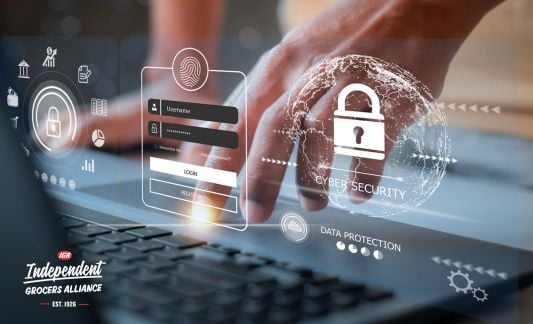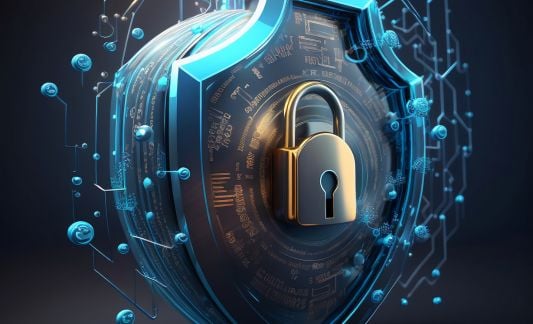Help Isom IGA recover from devasting floods

Earlier this month, United Natural Foods Inc., (UNFI), North America's largest publicly traded wholesale distributor, was hit by a cyberattack, forcing the company to take some systems offline and therefore affecting customer orders. It took 10 days for the wholesaler to restore systems to the point that they could receive and ship orders to their customers nationwide again.
Unfortunately, this hit isn't new in the grocery business. In November 2024, a cyberattack hit Ahold Delhaize USA, disrupting more than 2,000 stores including Hannaford, Food Lion, and Stop and Shop. This attack took down store websites, disrupted deliveries, and even prevented pharmacies from accepting debit and gift cards.
As the grocery sector increasingly becomes an attractive target for cybercriminals, independent grocers, often operating with limited resources and outdated systems, are particularly vulnerable. With limited cybersecurity resources like dedicated IT teams and outdated technology, independents are easy prey in possession of high-value customer data for criminals. And the worst part is that once the attack happens, it's very difficult for an independent to recover.
"All of a sudden your customers are being attacked — the cost is almost incalculable in these situations," Millennium Digital Technologies President Ken Andrews said. "Once that data is exfiltrated, the problem absolutely never goes away. Maybe you get your systems back up, maybe you've restored everything, but the data that's out, once the genie is out of the bottle you can't ever put it back. The key to all of this is just don't get yourself into the situation in the first place."
Common Cybersecurity Threats Facing Grocers
What cybersecurity threats are most common for independent grocers? Andrews broke it down:
- Ransomware: Malicious software that locks systems until a ransom is paid. The average ransomware attack costs businesses an average of 15 days of downtime and over $500,000 in payouts.
- Phishing: Fraudulent communications that trick employees into revealing sensitive information.
- Data Breaches: Unauthorized access to customer and employee data, leading to identity theft and fraud.
Best Practices for Cybersecurity
To mitigate these risks, Andrews recommends that grocers implement the following best practices:
- Regular Software Updates: Ensure all systems are up to date to protect against known vulnerabilities.
- Employee Training: Educate staff on recognizing phishing attempts and handling sensitive information securely.
- Data Encryption: Encrypt customer and employee data to protect it from unauthorized access.
- Multi-Factor Authentication (MFA): Implement MFA to add an extra layer of security to systems and accounts.
- Regular Backups: Maintain regular backups to recover data in case of an attack.
Implementing advanced cybersecurity solutions can significantly reduce the risk of attacks. For example, Millennium Digital Technologies offers a software solution that requires no hardware and addresses common sources of cyber incidents for small to mid-sized businesses.
EDR Guard (Endpoint Detection in Response) is a powerful antivirus solution that leverages AI (artificial intelligence) to examine your system's behavior and assess risks based on that behavior.
"With EDR, we're looking at the behavior of the user and the behavior of the applications," Andrews said. "For example, the behavior of the email you clicked on — we're looking at what it's trying to do on your system and then using AI to analyze that and say if it's a good action or a bad action. If it's a good action, we allow it to continue. If it's a bad action, we quarantine it."
Andrews noted that sensitive computers include both the retailer's own computer and computers that any employee is using to check their personal email. Every level of network access brings significant risks to a store's system.
The Independent Grocers Alliance (IGA) has partnered with Millennium Digital Technologies to provide a cybersecurity program with various levels of protection, including a free version that offers training modules, a security assessment, and best practices to get retailers started. The full level includes a managed firewall, 24/7 support, internet backup, PCI and PII protection, and more.
Cybersecurity is a critical concern for independent grocers. By understanding the risks, implementing best practices, leveraging technology solutions, and fostering a cybersecurity culture, grocers can protect their businesses from the growing threat of cyberattacks. As Andrews emphasized, "If you think that as an independent grocer you are not at risk, you're mistaken."
Previous Story
← IGA’s Big Game Giveaway Scores with Shoppers
You May Also Like
These Stories on Cybersecurity
May 14, 2024 4:17:03 PM |
3 min read



No Comments Yet
Let us know what you think